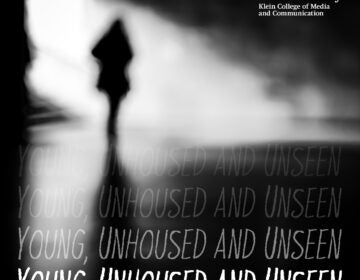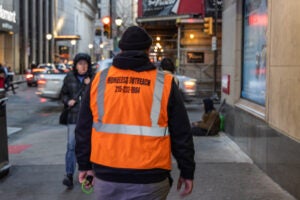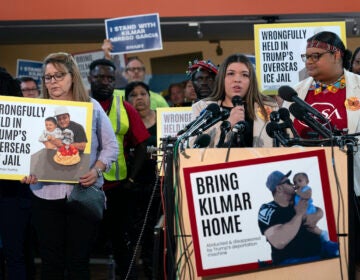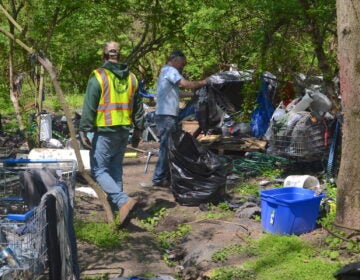A Supreme Court case could have major implications for homelessness in Philly region
Some legal scholars believe the Supreme Court’s decision could have far-reaching consequences beyond the issue of homelessness.
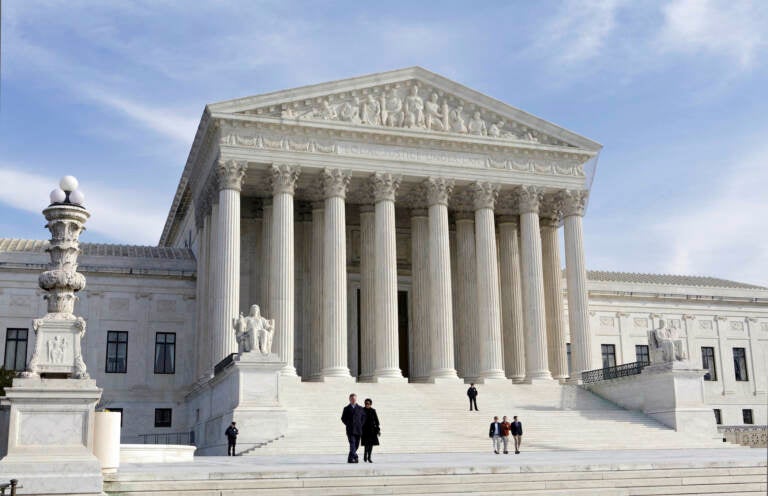
This photo shows the U.S. Supreme Court Building, Wednesday, Jan. 25, 2012 in Washington. (AP Photo/J. Scott Applewhite, File)
From Philly and the Pa. suburbs to South Jersey and Delaware, what would you like WHYY News to cover? Let us know!
The U.S. Supreme Court will soon hear a case, Johnson v. City of Grants Pass, that could have sweeping impacts on the nation’s homelessness crisis — and how this issue is handled in our region.
The case speaks to the rights of people who are experiencing homelessness, and whether cities can forcibly remove them when shelter beds and housing are not readily available.
This comes as the city of Grants Pass, Oregon — the defendant in the Johnson v. Grants Pass case — made arrests and ticketing enforceable against people in homeless encampments in 2018. It even banned the use of a pillow or blanket.
A lower court ruled that such actions were unconstitutional, and in direct violation of the Eighth Amendment’s “cruel and unusual punishment” clause.
SCOTUS’ decision on Grants Pass could dramatically reshape how communities can utilize law enforcement in dealing with issues around homelessness.
That includes areas such as Montgomery County, Pennsylvania, where the Borough of Pottstown was recently sued over plans to remove a homeless encampment — actions that a federal court would prevent, but now threatens to be overruled.
Homelessness advocates and legal experts are keeping a close eye on this case, which will be presented April 22.
“The easy way is to treat the people with issues as criminals and lock them up or drive them away,” said Scott Burris, director of the Center for Public Health Law Research at Temple University. “The hard way is to provide humane health and social services that give people a genuine opportunity to get off the streets, which then provides some arguably reasonable basis for the city to insist that people not live or otherwise cause inconvenience to others on the streets.”
Policy experts are concerned that the outcome of this case could hurt the most vulnerable people.
“When you look at all the ways that homelessness intersects with other marginalized identities, whether it’s race, gender, age, veterans status, all of these groups are going to be impacted,” said Eric Tars, Senior Policy Director at the National Homelessness Law Center and resident of Philadelphia.
The decision comes at a time when Philadelphia officials are trying to address a crisis situation in Kensington that’s fueled by the opioid epidemic, and the lack of affordable housing and rising costs of living have left many residents struggling to make ends meet.
“People are hanging on by a thread,” said Stephanie Sena, professor at Villanova University School of Law. “I get constant emails every day from people who said they fell behind on a payment and they’re facing eviction. They got sick and they missed a payment. They had to be out of work for a family emergency.”
In 2021, Sena sued Philadelphia over its efforts to remove homeless encampments in the neighborhood of Kensington.
Sena is also the founder and CEO of Breaking Bread Community Shelter — the only pet-friendly shelter in the Philadelphia region. Homelessness is not just a citywide issue, she said, but a suburban one that extends throughout the surrounding Philadelphia counties.
“In Delaware County (my county) there’s about 50 shelter beds. We have 200 people on a waitlist,” she said. “You can’t get on a waitlist unless you are literally homeless, so you cannot call up and say, ‘I’m living here, but I’m gonna be evicted tomorrow.’ They’ll say come back when you are evicted.”
To make matters worse, Sena also said that most people are prohibited from going to a shelter in a neighboring county.
“You can’t go to Montgomery County because aside from the fact that they don’t even have shelter, they won’t let you in without a Montgomery County ID. Just like we won’t let anyone in without a Delaware County ID,” she said.
A background of Johnson v. Grants Pass
The case goes back to an initial lawsuit that was filed in the U.S. District Court for the District of Oregon. It’s now being presented to the Supreme Court after the U.S. 9th Circuit Court of Appeals — which has jurisdiction over districts in Alaska, Arizona, California, Hawaii, Idaho, Montana, Nevada, Oregon, Washington, Guam and the Northern Mariana Islands — affirmed the district court’s decision.
Several years ago, plaintiffs representing themselves claimed that Grants Pass’ anti-camping laws punished them for being involuntarily homeless without any safer options for shelter.
The case was first called Blake v. City of Grants Pass, named after one of the plaintiffs Debra Blake, who died during litigation. Johnson (plaintiff) was in the original lawsuit and stayed on as a party.
Under Grants Pass’ municipal codes, people experiencing homelessness are prohibited from sleeping outside on sidewalks, streets or alleys. Those who violated the city’s anti-camping laws were subject to harsh penalties — in some instances, thousands of dollars in tickets and fines.
Plaintiffs in the lawsuit claimed that the city’s ordinances violated the Eighth Amendment of the United States Constitution, which states:
“Excessive bail shall not be required, nor excessive fines imposed, nor cruel and unusual punishments inflicted.”
The 9th Circuit Court also considered amicus briefs by the League of Oregon Cities and the National Homeless Law Center, which Philadelphia resident Eric Tars helped with.
“They [Grants Pass] passed these really cruel, extreme laws that make it illegal for people to do so much as wrap a blanket around themselves anywhere in the city — any time of day. In this case, the cruelty really was the point,” Tars said.
The court sided with the Grants Pass homeless residents. An appeal was later filed by Grants Pass, but the court stuck with its initial judgment.
Ultimately, the 9th Circuit Court concluded that under the Eighth Amendment, the nature of Grants Pass’ anti-camping ordinances were unconstitutional, given the town’s scarcity of safer alternatives than sleeping outside.
“It doesn’t stop cities from passing those anti-camping anti-sleeping laws,” Tars said. “It just says that they can’t enforce them if there’s literally nowhere else where people can go.”
Grants Pass, Oregon, is a small town in the southwest part of the state. Its population has grown to 40,000 in the last two decades.
The town’s average household income was $53,941 in 2022, according to the U.S. Census data — the poverty rate has also grown to about 15.7 percent.
In the midst of its population boom, the city’s homelessness rate spiked. Local reports estimated that the number of unhoused people was close to 600.
The 9th Circuit Court acknowledged that there were no shelters in Grants Pass that qualified under the The United States Department of Housing and Urban Development (HUD) criteria in their original judgment.
Gospel Rescue Mission — the only shelter in Grants Pass at the time — testified in the case that its two 30-day transitional housing facilities offered 60 beds for women and children and 78 spaces for men.
Eric Tars said that the town’s lack of adequate shelter beds has not met the needs of its population growth or rising cases of homelessness.
“There’s a 1 percent vacancy rate,” Tars said. “There’s no affordable housing where people can rent, and so when people lose their housing there, they have nowhere to go. So they have to shelter themselves on the streets.”
The case of Johnson v. Grants Pass had been preceded by a similar lawsuit heard by the 9th Circuit Court.
In 2009, six homeless plaintiffs sued the city of Boise, Idaho in a case called Martin v. Boise over similar anti-camping ordinances. The 9th Circuit Court heard the case in 2018 and concluded that Boise’s strict laws were unenforceable.
In 2019, after Boise lost its case, the city sought review from the U.S. Supreme Court. SCOTUS denied the appeal, leaving the U.S. 9th Circuit Court decision intact throughout the Western territories under its jurisdiction.
The city of Boise later invested over $1.3 million toward preventing homelessness. They also agreed to pay $435,000 of the plaintiffs’ fines and amended their anti-camping ordinance.
It’s unclear why the Supreme Court chose to hear arguments now after denying the appeal five years ago. What’s more perplexing is that no other Circuits have split from the 9th Circuit on this, Tars said.
“That’s the usual reason that the Supreme Court hears cases,” said Tars. “And while we agree that homelessness is an issue of national importance, we don’t think whether or not cities can punish people for surviving on the streets when there’s literally nowhere else for them to go is a controversial issue that is worthy of the Supreme Court ruling.”
The decision’s potential impact
The case of Johnson v. Grants Pass comes at a time when millions of Americans are experiencing homelessness and housing insecurity are at record highs.
In February, a Harvard University study found that rates of homelessness rose by 12 percent in 2023. The loss of pandemic-era relief funds and the lack of affordable housing could be driving the growing trend.
If the Supreme Court overturns Johnson v. Grants Pass — and subsequently Martin v. Boise — Tars warns that the consequences could be severe. Tars argued that SCOTUS could jeopardize decades of constitutional precedent under the Eighth Amendment.
“Depending on how broadly the Court rules,” he said, “this case could have implications far beyond homelessness on how other issues of cruel and unusual punishments are handled.”
But not everyone concurs with the application of the Eighth Amendment in this case.
John Stinneford is a professor at the University of Florida Levin College of Law. In a March legal brief, Stinneford wrote that the Supreme Court should reverse the previous judgements of the 9th Circuit Court.
He argued that the petitioner (City of Grants Pass) has not created vagrancy laws that violate the cruel and unusual punishment clause of the Eighth Amendment. He wrote:
“This is an easy case under the original meaning of the Cruel and Unusual Punishments Clause. The Clause was originally understood to prohibit punishments that are unjustly harsh in light of long-standing prior practice. Anti-vagrancy laws similar to the ordinances in this case have been common in the English and American legal systems since at least the fourteenth century.”
In a separate statement, Stinneford also said, “You should not take this to mean that I necessarily approve of the ordinances at issue as a policy matter, nor that I’ve come to any conclusions concerning their constitutionality under other constitutional provisions.”
But Eric Tars argued that vagrancy laws cannot be viewed as they were centuries ago.
“The Eighth Amendment is unique among some of the Constitutional provisions in that for centuries now, it has been interpreted in a way that requires us to look to our evolving moral standards. It doesn’t just focus on what life was like back in 1791,” he said.
A historic case that goes beyond homelessness
Johnson v. Grants Pass is taking shape as more than a court case related to homelessness.
“It is about more than half of American renters who may become homeless in the future and who are threatened — even if they don’t recognize it right now — with being exiled just because they are poor,” said Eric Tars.
Erza Rosser is a professor at American University, Washington College of Law and has followed Johnson v. Grants Pass ever since it was filed in the 9th Circuit Court.
“I think this is in some ways a sleeper case,” he said.
Similar laws compared to Grants Pass, Oregon’s anti-camping ordinance are currently being adopted around the country. Last week, Florida Governor Ron DeSantis signed a law requiring state municipalities to ban sleeping or camping outside.
In California, Governor Gavin Newsom wrote an amicus brief filed in the Grants Pass case before the Supreme Court calling ongoing lawsuits blocking “the most common-sense efforts to clear encampments that pose health and safety concern.”
In a statement he wrote, “The United States Supreme Court can establish a balance that allows enforcement of reasonable limits on camping in public spaces, while still respecting the dignity of those living on our streets.”
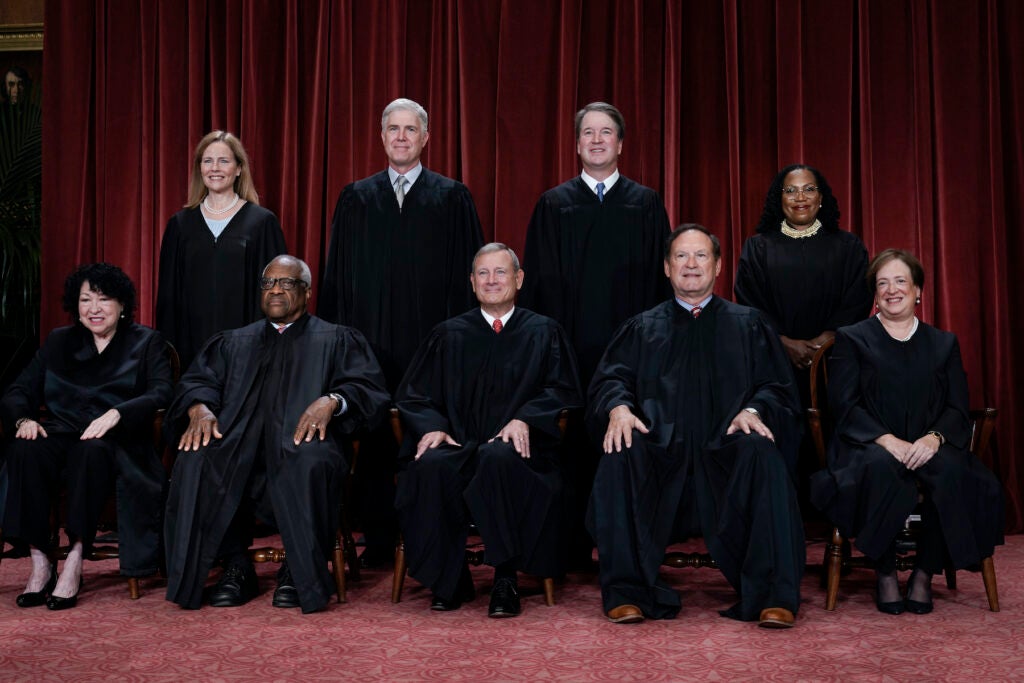
But Ezra Rosser believes that using public safety as a justification to displace homeless encampments can be used to provide quick and temporary bandaids in a situation that needs much more resources.
He also noted that the 9th Circuit Court concluded that Boise and Grants Pass had other options for their efforts to curb homelessness. The issue was not removing homeless encampments. It was doing so knowing that beds, shelters and housing were not available.
“They can create areas where they do push people out as long as they allow other space,” he said. “They’re not saying that the city can’t do anything. They’re just saying they can’t go at it everywhere.”
When it comes to homeless encampments, public safety and law enforcement can sometimes be politically motivated solutions but the results are lacking, Rosser said.
“Anytime you see these punitive laws targeting poor people, it’s also speaking to the non-poor and saying to the non-poor, ‘You are a good person because you don’t have to do this and if you’re not a good person we’re gonna make it really hard,’” he said. “It reaffirms middle class values by punishing the poor and that can’t be the right thing.”
Rosser said that Johnson v. Grants Pass is the type of case that the court has rarely spoken on in the past.
“In the Great Depression, the court took a step back from economic regulation, and also property law has generally deferred to localities on things ever since it allowed zoning in Euclid [Ohio],” he said. “Here, we see a court deciding ‘we’re gonna take cert (certiorari) on this thing and step in.’”
SCOTUS made its first interpretation of the Eighth Amendment in the landmark case of Robinson v. California 370 U.S. 660 (1962).
In 1962, the court reversed a California statute that made addiction to drugs criminalized statewide. Although the court determined that possession or distribution of drugs could be punished, it was unconstitutional for the defendant (Robinson) to be convicted based on his drug addiction status.
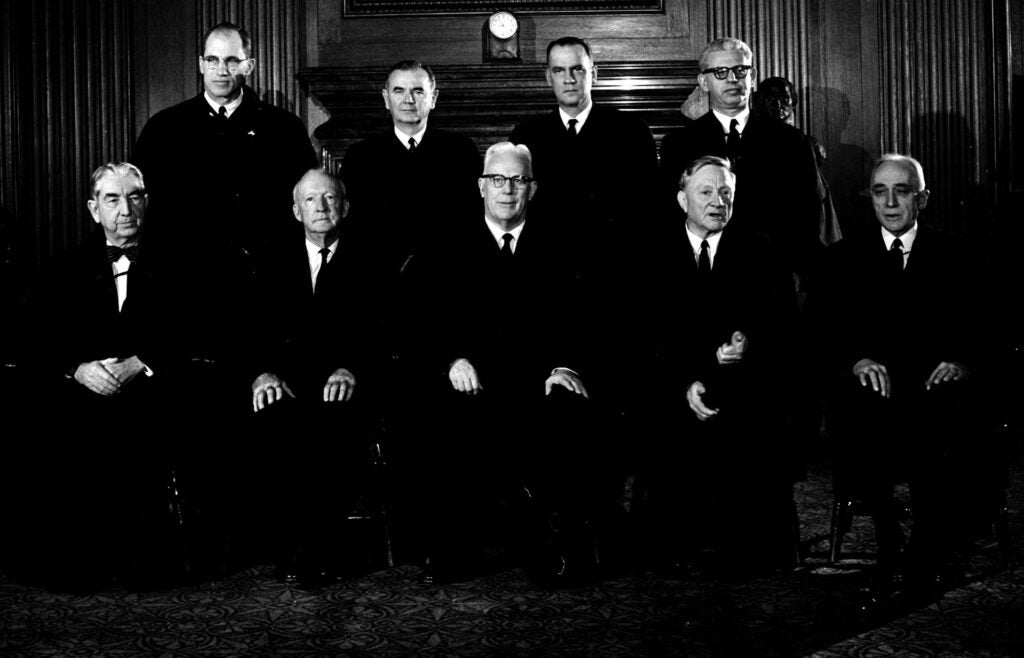
Almost six years later, a similar argument was considered by the Supreme Court in the case of Powell v. Texas, 392 U.S. 514 (1968). The defendant (Powell) was a chronic alcoholic who was convicted of public intoxication. The judges concluded that his condition was not a defense against being drunk in public.
Homelessness is also another version of the crisis in Kensington
SCOTUS’ decision could have a ripple effect on several current situations in the region.
In Philadelphia, city officials have worked to clear out an encampment at Philadelphia International Airport, while trying to provide support services for unsheltered individuals.
The case of Johnson v. Grants Pass also comes during a time when emergency housing options continue to shrink for people experiencing homelessness in the city.
But the ongoing opioid crisis has also grabbed a lot of attention.
The city has tried cleaning up not just homelessness encampments, but shutting down the open-air drug market in Kensington. In recent months, those efforts to clear out encampments and open drug use have ramped up.
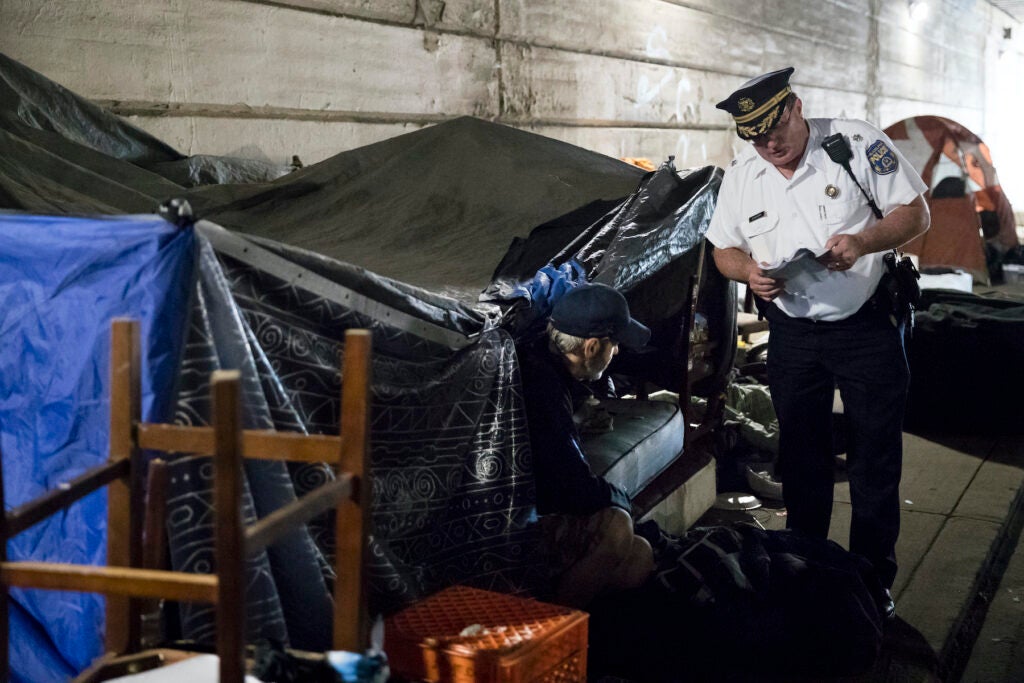
Scott Burris, director of the Center for Public Health Law Research at Temple University, said it’s hard to ignore the impact SCOTUS’ decision could have on the opioid crisis.
“I personally don’t think that people have a right to use drugs on the street in a way that impairs or harms the community and makes other people uncomfortable,” he said. And Burris also expressed criticism of the city allowing Kensington to be an open-air drug market.
“I don’t think we should allow open-air drug markets and great homeless encampments to last in our cities because it’s utterly corrosive to the overall sanity and healthiness of the society,” he said.
He’s also been concerned about the city’s law enforcement approach. Instead, he said there needs to be a state and federal commitment to providing alternatives, especially providing more shelter and housing.
When it comes to Johnson v. Grants Pass, he said the case will only decide how to “rearrange the deckchairs on the Titanic” rather than avoiding “colliding with icebergs in the first place.”
“The War on Drugs resulted in incarceration, to lots of violence, the militarization of our police — and yet the one thing it has never done is control drug markets. The idea that, ‘Well, we’ve been nice for too long. It’s time to get back to what works’… It will not work.”

Get daily updates from WHYY News!
WHYY is your source for fact-based, in-depth journalism and information. As a nonprofit organization, we rely on financial support from readers like you. Please give today.


